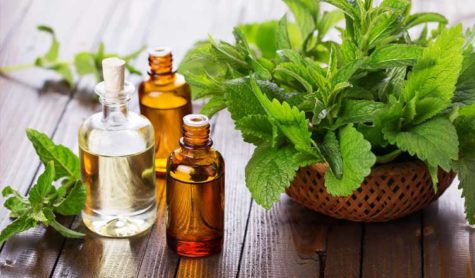Digestion
Essential Oils for Abdominal Pain
Abdominal pain should be checked by a doctor if it persists and increases in intensity because it could be appendicitis or another condition that needs to be properly diagnosed.
Upper Abdominal Area:
Apply the following oil over the painful area in a clockwise direction:
- 3 drops Peppermint
- 2 drops Clove
Dilute in 1 teaspoon vegetable or carrier oil.
Other essential oils that could be used include the following: Angelica, Anise, Chamomile, Coriander, Eucalyptus, Fennel, Marjoram
Lower Abdominal Area:
Apply the following oil over the painful area in a clockwise direction:
- 2 drops Thyme
- 3 drops Eucalyptus
Dilute in 1 teaspoon vegetable or carrier oil.
Other essential oils that could be used include the following: Geranium, Ginger, Patchouli, Peppermint, Rosemary
Source: Complete Book of Essential oils and Aromatherapy
Chamomile Essential Oil
There are several types of chamomile essential oil. German Chamomile is an excellent variety and its beautiful deep dark blue color, due to its high azulene content, comes as a bonus. Another excellent variety, Roman chamomile, is particularly good for the treatment of nervous conditions and insomnia. Beware though of chamomile Maroc (Ormenis multicaulis) which is not a true chamomile and cannot be used as such.
Generalities
Chamomile is that wonderful yellow daily-like flower that is used for everything: cosmetics, fragrance, oil, herbal baths, soothing tea. The root is used for toothache and the entire plant in herbal therapeutics. The whole plant is used from root to flower. The essence is obtained by steam distillation of the flowers. Chamomile smells sweet, resembling fresh golden apples, and this fruity scent has given it the name of Manzanilla in Spanish-speaking countries.
The Egyptians had a great reverence for Chamomile and used it in massage oils to remove aches and pains. Sports-minded people will like using the flowers in a bath for relaxation and to ease aching muscles. This plant was one of the favored strewing herbs of the Middle Ages, to sweeten the air of a room and create a relaxing atmosphere.
The scent is rejuvenative and especially helpful to those of a sensitive nature. Inhaling the herby, aromatic, slightly bitter but always refreshing scent of Chamomile will ease your depression, soothe your irritable nature, lull you into a restful sleep and calm you. Use the oil straight or use it in combinations to relax and soothe a busy household after a trying day.
A busy person might like dabbing a drop or two of Chamomile oil on the forearm, to inhale occasionally during the day , for relaxation and to allay temper. Remember that oil of Chamomile is recommended for use in the diffusor, in a child’s room, for the anesthetic, for the calm that will come, for sweet sleep.
German Chamomile
German chamomile has been highly esteemed for over 3,000 years and has been used for many types of skin conditions and stress related complaints.
- Application:
Diffuse, add to food or water as a dietary supplement, or apply topically on location. Among the gentlest oils used in aromatherapy, the chamomiles are suitable for use on children.
- Fragrant Influence:
Dispels anger, stabilizes emotions, and helps release emotions linked to the past. It may also be used to soothe and clear the mind.
- Safety Data:
If pregnant or under a doctor’s care, consult your physician.
German chamomile is a cleanser of the blood, helps increase liver function and secretion, and supports the pancreas. German chamomile promotes the regeneration of skin and can be used for abscesses, burns, rashes, cuts, dermatitis, teething pains, acne, eczema, chronic gastritis, infected nails, cystitis, inflamed joints, menopausal problems, sores, skin disorders, stress related complaints, toothaches, ulcers and wounds.
Roman Chamomile
Roman chamomile is used extensively in Europe for the skin. For centuries, mothers have used Roman chamomile to calm crying children, ease earaches, reduce fevers, soothe stomachaches and indigestion, and relieve toothaches and teething pain.
- Application:
Diffuse or apply topically on bottom of feet, ankles, wrists or on location. Add to food or soy / rice milk as a dietary supplement. Among the gentlest oils used in aromatherapy. All of the chamomiles are suitable for use on children.
- Fragrant Influence:
Because it is calming and relaxing, it can combat depression, insomnia, and stress. It minimizes anxiety, irritability, and nervousness. It may also dispel anger, stabilize the emotions, and help to release emotions that are linked to the past.
- Safety Data:
If pregnant or under a doctor’s care, consult your physician. Test for skin sensitivity.
Roman chamomile neutralizes allergies and increases the ability of the skin to regenerate. It may help calm and relieve restlessness and tension. Its anti-infectious properties benefit cuts, scrapes, and bruises It is a cleanser of the blood and also helps the liver discharge poisons.
This oil may help with allergies, bruises, cuts, depression, insomnia, muscle tension, nerves (calming and promoting nerve health), restless legs, and skin conditions, such as acne, dermatitis, eczema, rashes, and sensitive skin. It can effectively minimize irritability and nervousness in hyperactive children.
Collected from various sources
Peppermint Essential Oil
Peppermint has been used by many ancient cultures, including the Egyptians, Chinese, and American Indians, no doubt because of its extremely useful health-promoting properties.
- Application:
Diffuse. Massage on the stomach or add to water or tea for supporting normal digestion. Apply to bottom of feet or rub on the temples to treat headaches. To improve concentration, alertness, and memory, place 2 drops on the tongue. Add to food as a flavoring and preservative. Add a drop or two to a bottle of water curb appetite, and for a cooling refreshment on a hot day.
- Fragrant Influence:
It is purifying and stimulating to the conscious mind.
- Safety Data:
If pregnant or under a doctor’s care, consult your physician. Avoid contact with eyes, mucus membranes, or sensitive skin areas. Do not apply “neat” to a fresh wound or burn.
Peppermint is one of the oldest and most highly regarded herbs for soothing digestion, and has been extensively studied for it’s effect on the liver and respiratory systems. Peppermint has also been researched for it’s role in affecting impaired taste and smell when inhaled, and it’s ability to improve concentration and mental accuracy.
One study examined peppermint’s ability to directly affect the brain’s satiety center which triggers a sensation of fullness after meals.
It is an excellent digestive, it helps the respiratory system and circulation, it is an anti-inflammatory, and an antiseptic. These qualities make it a good oil in the treatment of indigestion, flatulence, bad breath, flu, catarrh, varicose veins, headaches and migraines, skin irritations, rheumatism, toothache, and fatigue. It even keeps mice, fleas, and ants away.
If you chew on a Peppermint leaf and then suck in air, a distinct cooling effect will be felt in your mouth. This cooling effect is from the presence of menthol, which is useful in making cosmetics and body-care products.
Peppermint oil is extremely useful when you are hot either from a hot fever, hot flashes, or hot weather. Inhaled it cools a fever, decongests the sinuses, calms the mind, soothes a headache, acts as an antidepressant, stimulates the nervous system and mind, also calms the tendency for your mind to race.
- External Uses
Peppermint oil is used as an antiseptic to wounds and sores (use only in a very diluted form), as a chest rub for respiratory diseases (use in a blend of oils or fats), as a skin cleanser (hydrosol or water spray), and in rubs for aching muscles and limbs.
- Internal Uses
Peppermint oil has a proven reputation to cure nausea and vomiting. One drop on a sugar cube sucked slowly, or two drops in 8 ounces of water and slowly sipped.
Always use Peppermint oil diluted, as it can burn and irritate when used neat. Peppermint oil in a lotion has an interesting feature in that it cools while it warms. The menthol increases blood flow wherever it is applied, soothes while it gives a cooling feeling. Try it as a muscle rub for tired feet.
Peppermint oil can also be added to water and given to both pets and people to cure flatulence. One or two drops of peppermint oil per 6 oz of water should be sufficiently strong enough to cure the problem.
Collected from various sources






